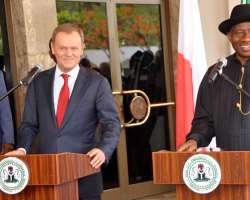Nigeria Assured of Poland's Support On Bid For UNSC Seat

SAN FRANCISCO, April 11, (THEWILL) - Polish President, Donald Tusk, has assured that his country will back Nigeria in her bid to become a non-permanent member of the United Nations Security Council (UNSC).
Tusk, who was on a two-day official visit to Nigeria, and is expected to depart Abuja on Friday, gave the assurance, Thursday, during a meeting with President Goodluck Jonathan at the State House.
A communique jointly issued at the end of the meeting said both leaders agreed to work together to ensure that Nigeria secures the UNSC seat next year.
Currently, there are 10 non-permanent members of the UNSC, which together with the five permanent members- U.S., UK, France, Russia and China, make up the 15-member body.
They are empowered by the UN Charter to ensure maintenance of international peace and security, investigate disputes that may escalate and the formulate plans for the establishment of a system to regulate armaments.
The 10 non-permanent members that Nigeria seeks to join are: Argentina, Australia, Azerbaijan, Guatemala, Luxembourg, Morocco, Pakistan, Rwanda, South Korea, and Togo.
The communiqué said further that both leaders “agreed to support Nigeria’s candidature for election as a non-permanent member of the UNSC for the period 2014-2015,” while welcoming “the ongoing efforts aimed at reforming the United Nations in order to equip it better to meet the current challenges in the maintenance of international peace and security.”
They called for “the urgent reform of the United Nations Security Council to make it more democratic and reflective of the changes in the international architecture since 1946.”
They called for “the urgent reform of the United Nations Security Council to make it more democratic and reflective of the changes in the international architecture since 1946.”
Nigeria became a member of the UN on October 7, 1960.
At a joint press briefing after their meeting, Jonathan stated that the two countries reviewed the state of their bilateral relationship and decided to upscale it to shore up international trade and investment.
He said apart from discussing the current situation in the international environment, they also signed a Memorandum of Understanding (MoU) on trade and investments, infrastructural development, agriculture and allied industries, oil and gas and others including hospitality.
All these, according to Jonathan, are precursor to establishing a bi-national commission between the two countries. “Poland is s very important European country, which we have had very cordial relations many years ago. We have been co-operating at all international fora that the two countries belong and we have worked together in so many ways,” Jonathan added.
Also speaking at the briefing, Tusk noted that “Nigeria is one of the most promising economies in the world and Poland is the country that copes the best with the financial crisis of the world and member state of the European Union.”
He also noted that the economic potentials of both countries are very promising and comparable. : “Our common issues include trade, energy, agriculture, defense and foreign policy. Our experiences, skills and potentials can be complementary and not competitive.
Nigeria is in the focus of interest of growth because of the abundant natural resources including oil,” he said.
He said there is a sign of hope of freedom and development of human rights that can spread throughout the continent as result of the courage and ambitions of Nigerians, stressing that these are “the strongest magnet that is attracting Poland to Nigeria.”
The joint communiqué by the two leaders also noted the importance of exchanging visits at the highest levels, and commended the visit to Poland by President Olusegun Obasanjo in 2001.
Their talks also centred on political cooperation, Guinea-Bissau and Mali, trade and investment as well as socio-cultural issues.
